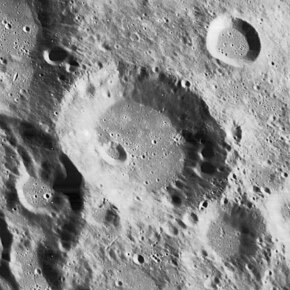
Lunar Orbiter 4 image | |
| Coordinates | 51°36′S 35°00′W / 51.6°S 35.0°W |
|---|---|
| Diameter | 47 km |
| Depth | 2.0 km |
| Colongitude | 35° at sunrise |
| Eponym | Johann Bayer |
Bayer is a lunar impact crater located in the southwest section of the moon, to the east of the crater Schiller. The rim of Bayer is slightly worn by erosion, but remains well-defined. There is an inner terrace, but the outer wall is intruded upon by nearby impacts. The most significant of these is Schiller H, which forms a ridge attached to the northwest rim of Bayer. The floor of Bayer is relatively flat and lacks a central peak. There is a small, but notable crater on the floor near the western wall. This crater has a breach in its northern rim.
Satellite craters
By convention these features are identified on Lunar maps by placing the letter on the side of the crater midpoint that is closest to Bayer.
| Bayer | Latitude | Longitude | Diameter |
|---|---|---|---|
| A | 51.3° S | 30.3° W | 18 km |
| B | 48.8° S | 28.2° W | 18 km |
| C | 49.7° S | 31.2° W | 22 km |
| D | 47.9° S | 29.8° W | 20 km |
| E | 51.7° S | 32.3° W | 29 km |
| F | 53.0° S | 31.6° W | 20 km |
| G | 51.7° S | 35.3° W | 7 km |
| H | 53.5° S | 32.5° W | 27 km |
| J | 52.5° S | 33.6° W | 18 km |
| K | 50.2° S | 34.0° W | 16 km |
| L | 47.5° S | 33.6° W | 14 km |
| M | 50.6° S | 31.0° W | 10 km |
| N | 48.3° S | 29.2° W | 9 km |
| P | 51.6° S | 29.5° W | 4 km |
| R | 52.5° S | 35.5° W | 9 km |
| S | 52.3° S | 36.4° W | 13 km |
| T | 49.2° S | 30.1° W | 8 km |
| U | 48.4° S | 31.3° W | 10 km |
| V | 47.5° S | 31.6° W | 9 km |
| W | 48.0° S | 33.5° W | 9 km |
| X | 53.4° S | 33.6° W | 8 km |
| Y | 49.2° S | 35.7° W | 31 km |
| Z | 49.0° S | 33.4° W | 7 km |
References
- Andersson, L. E.; Whitaker, E. A. (1982). NASA Catalogue of Lunar Nomenclature. NASA RP-1097.
- Blue, Jennifer (July 25, 2007). "Gazetteer of Planetary Nomenclature". USGS. Retrieved 2007-08-05.
- Bussey, B.; Spudis, P. (2004). The Clementine Atlas of the Moon. New York: Cambridge University Press. ISBN 978-0-521-81528-4.
- Cocks, Elijah E.; Cocks, Josiah C. (1995). Who's Who on the Moon: A Biographical Dictionary of Lunar Nomenclature. Tudor Publishers. ISBN 978-0-936389-27-1.
- McDowell, Jonathan (July 15, 2007). "Lunar Nomenclature". Jonathan's Space Report. Retrieved 2007-10-24.
- Menzel, D. H.; Minnaert, M.; Levin, B.; Dollfus, A.; Bell, B. (1971). "Report on Lunar Nomenclature by the Working Group of Commission 17 of the IAU". Space Science Reviews. 12 (2): 136–186. Bibcode: 1971SSRv...12..136M. doi: 10.1007/BF00171763. S2CID 122125855.
- Moore, Patrick (2001). On the Moon. Sterling Publishing Co. ISBN 978-0-304-35469-6.
- Price, Fred W. (1988). The Moon Observer's Handbook. Cambridge University Press. ISBN 978-0-521-33500-3.
- Rükl, Antonín (1990). Atlas of the Moon. Kalmbach Books. ISBN 978-0-913135-17-4.
- Webb, Rev. T. W. (1962). Celestial Objects for Common Telescopes (6th revised ed.). Dover. ISBN 978-0-486-20917-3.
- Whitaker, Ewen A. (1999). Mapping and Naming the Moon. Cambridge University Press. ISBN 978-0-521-62248-6.
- Wlasuk, Peter T. (2000). Observing the Moon. Springer. ISBN 978-1-85233-193-1.
